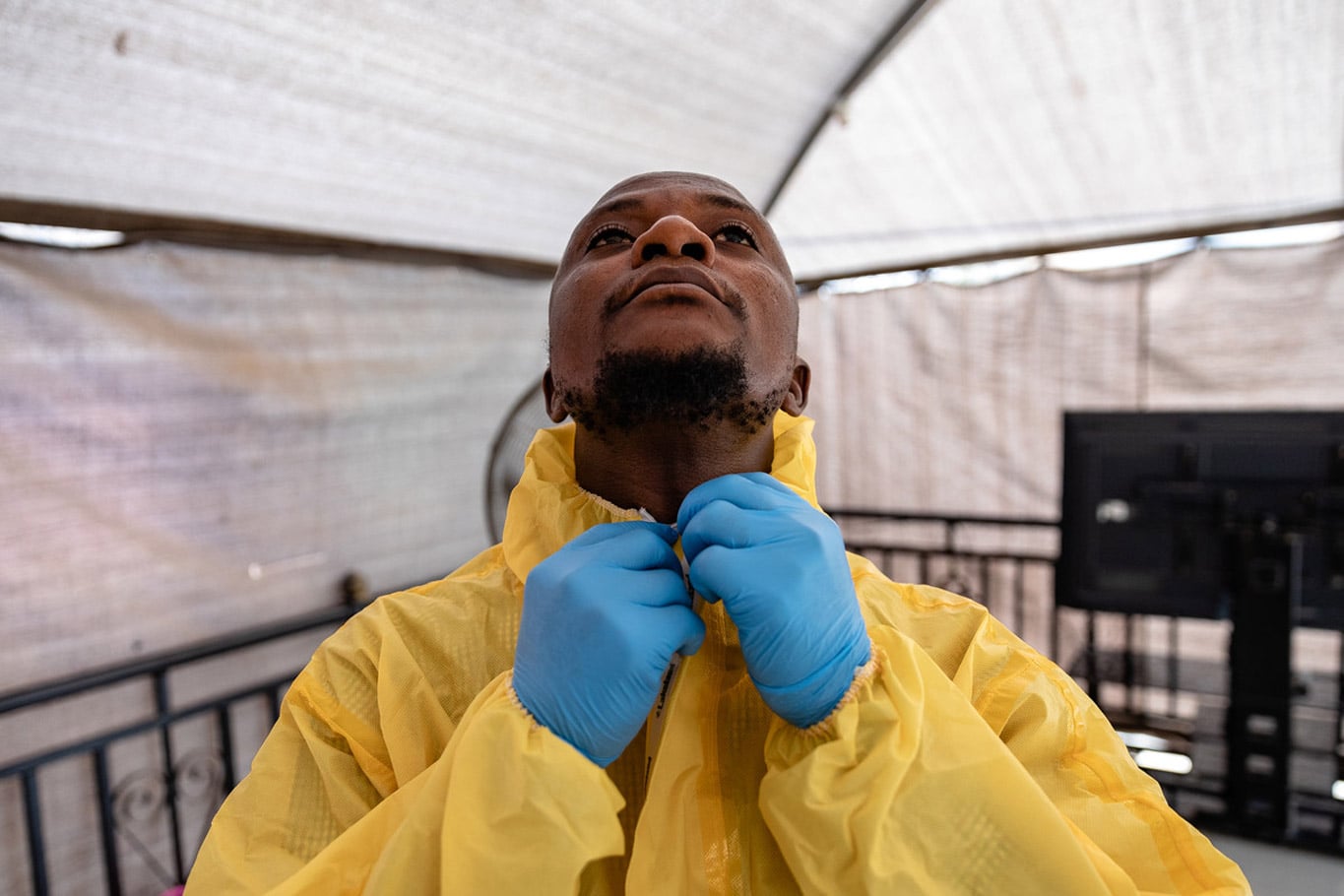Research, education and action
We have a strong track record of responding to emergencies and major outbreaks, whether through research or by providing immediate information, advice, courses and action.
Our experts have contributed to tackling SARS, swine flu, zoonotic diseases and many other health threats. This work came to particular prominence during Ebola (2014-16) and Zika (2016-16) outbreaks when our staff and students mobilised to help investigate from all angles and seek solutions as quickly and effectively as possible.
As a result, LSHTM was chosen to jointly run the UK Public Health Rapid Support Team (UK-PHRST) in partnership with Public Health England. Funded by the UK Government, this team provides the UK with a fully operational specialist team that can be deployed anywhere in the world to tackle disease outbreaks which have the potential to develop into major health emergencies.
Since launching in November 2016, the UK-PHRST team - led by Professor Dan Bausch - has deployed to: Ethiopia (acute watery diarrhoea, April 2017); Nigeria (cerebral meningitis, May 2017); Sierra Leone (water-borne disease surveillance, especially cholera and salmonella, August 2017); Madagascar (pneumonic plague outbreak, October 2017); Bangladesh (diphtheria, December 2017); Nigeria (Lassa fever, February 2018); Bangladesh (infectious disease outbreaks in the Rohingya refugee camps in Cox’s Bazar, February 2018); Democratic Republic of the Congo (Ebola, May 2018). Find out more about UK-PHRST deployments.
LSHTM experts are currently involved in the response to the novel coronavirus outbreak (COVID-19).
Ebola in the Democratic Republic of the Congo (DRC)
As DRC is faced the world’s second largest Ebola epidemic on record, experts from across LSHTM have been crucial in supporting the response. Experts from the UK-PHRST were deployed throughout 2019 to support the DRC government and WHO with the response on the ground.
An Ebola vaccine was pre-qualified for the first time by WHO, following earlier work from LSHTM researchers led by WHO and Professor John Edmunds to design a major trial of 12,000 people in Guinea which found the vaccine, manufactured by Merck, was safe and highly protective against Ebola.
With support from the EU since 2015, Professor Debby Watson-Jones and colleagues in Sierra Leone and several African countries have been studying the two-dose Ebola vaccine manufactured by Johnson & Johnson. In 2019, Professor Pontiano Kaleebu’s team in Uganda started a two-year trial among healthcare and frontline workers to investigate the J&J vaccine. This second vaccine was also introduced in DRC as part of a large-scale clinical trial, led by Prof Jean Jacques Muyembe of the Institut National de Recherche Biomédicale (DRC) with Profs Bausch and Watson-Jones, sponsored by LSHTM in collaboration with Médecins Sans Frontieres to help prevent the spread of the epidemic and gather crucial information about its effectiveness to be better prepared to fight Ebola in the future.
Discover our Ebola research publications and data in our online repositories. Read media coverage about the LSHTM’s Ebola response.
Looking back at Zika
In the wake of Ebola, a new public health emergency hit with Zika. The virus, spread by Aedes mosquitoes, and its associated health effects had a devastating impact in 2016.
Experts from LSHTM were actively involved in responding to the outbreak, carrying out research into areas including the links with microcephaly among babies born to women with Zika, vector control methods, outbreak mapping, and potential vaccines, treatments and diagnostics. Staff including Professor Laura Rodrigues were already investigating in Brazil when the WHO declared that the cluster of microcephaly cases and other neurological disorders were a public health emergency of international concern. The announcement triggered investment in mosquito control efforts and vital funding for research into the virus and its health consequences and allowed for the scale-up of initial efforts. We developed a free online course ‘Preventing the Zika Virus: Understanding and Controlling the Aedes Mosquito’.
Experts worked on a number of studies into Zika as part of the ZikaPLAN and ZIKAlliance collaborations, including the risks the virus poses to newborn babies, routes of transmission, its potential global spread and ways to stop it.
Discover our Zika research publications and data in our online repositories. Read media coverage about LSHTM’s Zika response.
Looking back at Ebola in West Africa
When the Ebola outbreak in West Africa was declared a public health emergency of international concern in August 2014, LSHTM coordinated urgent response efforts. More than 400 academic and professional services staff volunteered to deploy via organisations including Save the Children, Médecins Sans Frontières and Public Health England. Some went to affected countries, others advised governments and international agencies, backfilled posts at the World Health Organization (WHO) or carried out mathematical modelling and other research to support Ebola response planning.
Activities were also focused on working with communities to develop culturally sensitive ways of preventing the spread of the virus through the Ebola Response Anthropology Platform and fast-tracking clinical trials of Ebola vaccines and treatments. Students even cleansed Ebola patient record data for WHO to ensure sites of outbreaks were recorded accurately.
We launched a free online course ‘Ebola in Context: Understanding Transmission, Response and Control’ to provide a better understanding of the Ebola virus for health professionals, workers in the field and students – more than 24,000 people from 185 countries participated in the first run of the course.
The work of LSHTM experts throughout the Ebola outbreak was instrumental in mobilising the international community, helping to shape the response of governments, NGOs, and international health agencies, and educating future leaders in public and global health. Our far-reaching efforts were recognised by the award of University of the Year 2016 from Times Higher Education.
Although this response helped to eventually bring the virus under control, research including vaccine trials such as EBOVAC are still under way in the hope that prolonged protection will be possible and prevent further epidemics on this scale.
Discover our Ebola research publications and data in our online repositories. Read media coverage about the LSHTM’s Ebola response.
